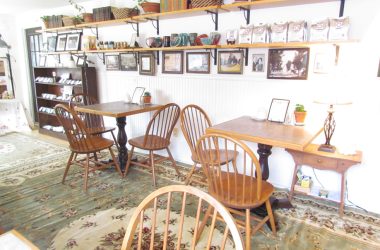by David K. Rodgers
“Farm Boy”, a new feature-length film by George Woodard, is now being shown at various locations around Vermont including The Highland Center for the Arts in Greensboro on May 21.
Woodard, a dairy farmer in Waterbury Center, has been working on it for almost six years; imagining the basic plot, writing the screenplay, envisioning the sequence of camera shots, assembling the cast of three main characters and over three dozen supporting actors and technical crew, building the necessary sets, doing the actual filming (mostly on his own 200 acres on the west side of the Worcester Range) and then editing the final version into the flowing montage of this 150 minute movie.
The work is divided into two main parts: the first half is set in rural Vermont in 1943 and gives a wonderful evocation of life on hill dairy farms at that time, with rich, authentic detail in the costumes, interiors and even typical dialogues and expressions. It serves to characterize two of the three main figures in the film, focused on their poignant story of first love.
The hero of the whole epic is Calvin Dillard, played by Woodard’s son, Henry. He starred in “The Summer of Walter Hacks,” that powerful and beautiful film which was Woodard’s first full length production, in which Henry’s precocious acting skills (he was barely a teenager at the time) were astonishing.
The accumulative incidents in the Vermont scenes in “Farm Boy” show Calvin with a strong work ethic in his job driving a truck to pick up milk from local farms to take to the creamery. He is tall, handsome and strong, constantly ready to help others, having impressive mechanical skills diagnosing and repairing any kind of vehicle (car, truck, or tractor), a real problem solver, intelligent (despite having left school early to work on the farm) and centered, with a fundamental moral integrity, but also with a playful sense of humor.
Throughout the film, Henry Woodard has the dominating stage presence of a superlative actor, embodying the character we can immediately identify with. Mary Small, a neighboring young farm girl with whom Calvin develops a relationship, is finely portrayed by Grace Woodruff, consistently in
character. She is sweet but shy, initially reluctant to show her deep feelings of love for Calvin.
Like him, she is a hard worker and can do anything around her family’s farm. At one point, her appreciative father says, “I don’t know what I’d do without her.”
In extreme contrast to the idyllic peacefulness of Vermont, the second half of the film is set in eastern Belgium in the winter of 1944-45, one of the coldest on record in Europe. As the Allied Armies swept towards the German border, the Nazis made a desperate counter offensive in the Ardennes Forest, which became the Battle of the Bulge.
Calvin has been drafted and sent to the front lines where violence and death are every moment dangers. Elements of these scenes were partly inspired by Woodard’s own father’s World War II experiences.
Here the rhythm and momentum of the plot changes dramatically, with masterfully built tensions and thrilling action scenes as Calvin manages to survive a series of life-threatening situations. His mechanical skills repeatedly serve to be his salvation, which illustrates historical truth about why American forces were victorious in that war, in part because there were many “farm boys” who
could fix anything in an emergency on the battlefield.
The third main character in the film is Renee, a young French woman, played with thorough professionalism by Coco Mosely. She is living with an older couple on a remote farm in the forest. They have all been part of the resistance movement against the Nazis and take Calvin in when he is knocked unconscious and separated from his unit during artillery shelling.
At first Renee is unsympathetic to him and even hostile, fearing what might happen if Nazis discover that they are harboring an American soldier. But her attitude changes completely as circumstances unfold and Calvin saves her from several dangerous scenarios. These scenes reinforce the underlying feeling that even in the most terrible situations there are compassionate human beings, willing to help others who are suffering. War brings out the best in some people
and the worst in others.
Woodard’s choices for the large cast of supporting actors is excellent, and there is a remarkably high level of performance by all the various characters, each one entirely natural and believable. This film was like genuine community theater, since almost all of them were volunteers with significant acting ability who wanted to be part of a George Woodard movie and share his passion for the art.
Vermont has many people with acting talent, nourished over the years by high school drama clubs and local theater groups such as the Lamoille County Players, where Woodard himself began to develop his own love of the stage. And for at least a decade he entertained enthusiastic audiences around Vermont with his own delightful “Ground Hog Opry” variety show.
“Farm Boy” shows Woodard’s mastery of cinematic technique, artistry in framing the shots, with appropriate lighting, and creating meaningful montages of successive camera angles into a smooth flow with a compelling momentum. He really understands the medium, and this black and white film has a visual richness that makes it a masterpiece, a true work of art.
Currently Woodard and producer Joan Brace O’Neal are touring central Vermont with screenings and have played to full houses in Montpelier, Randolph, Hyde Park, Hardwick, Brandon, Bristol, Essex and St. Johnsbury. Locally it will be shown at the Highland Center for the Arts in Greensboro on Sunday, May 21, at 2 p.m. It should not be missed.




